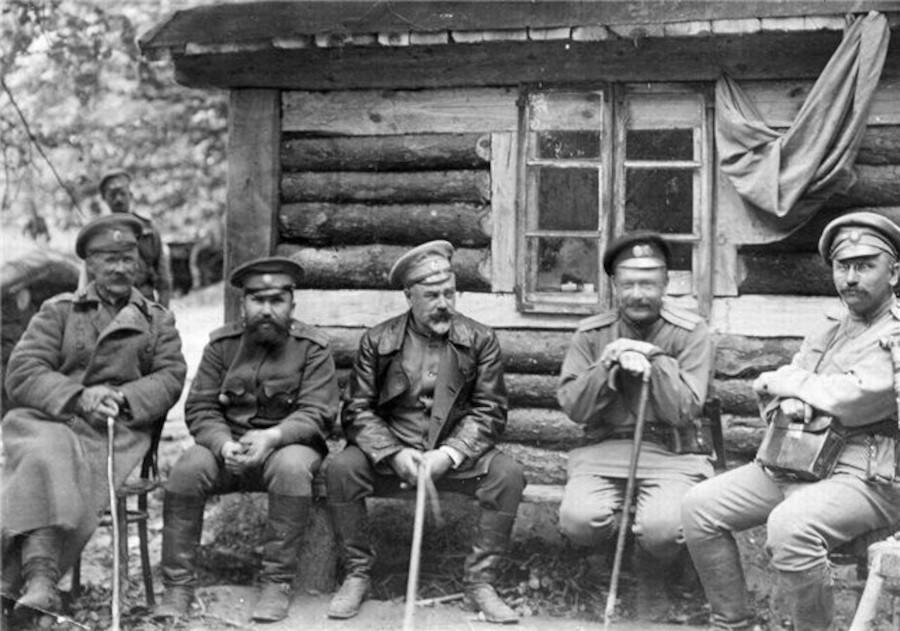Back to article index
Previous
THE 'WHITES'

Anton Denikin (centre)
The struggle of Petliura with the Bolsheviks ran into the struggle of the Whites with the Bolsheviks, the struggle of the ZUNR with the Poles, the fluctuating interest of the Entente and, most complicated of all, the struggle of the 'Greens' - the many more or less independent peasant militias, entering into temporary alliances of convenience with the different parties that aspired to govern the territory but who remained essentially opposed to any attempt to form a government that would rationalise agriculture or try to exercise compulsion to obtain the grain necessary for feeding their own armies.
The Whites were divided into two main groups - the one in the East, originally centred on Social Revolutionaries wanting to reaffirm the authority of the Constituent Assembly, dissolved by the Bolsheviks in February 1918; the other in the West, the 'Volunteer Army', originally put together by the former chief of staff General Alekseev, joined by Lavr Kornilov, then by the leader of the Don Cossacks, General Alexis Kaledin. Following Richard Pipes, (8) the Don, Kuban and Terek Cossacks had originally hoped for independence from Russia under German patronage and it was only with the collapse of the German army and the threat posed by the Bolshevik policy of land nationalisation that they turned to the Whites. Through 1918 Alekseev and Kornilov were largely at war with the Cossacks, especially after, early in 1918, Kaledin, sympathetic to the Volunteer Army, committed suicide. Kornilov was killed besieging the Kuban capital Ekaterinodar which was held at the time by the Bolsheviks. He was replaced by Anton Denikin. Alekseev died in October 1918 and in January 1919 Denikin became supreme commander of the Anti-Bolshevik forces in the South. With the departure of the Germans, the new leader of the Don Cossacks, PN Krasnow, elected in May 1918, was forced to cooperate with him.
(8) This account is drawn from Pipes: Russia under the Bolshevik régime.
Meanwhile, with British backing, Admiral Kolchak became 'dictator' in the East through a coup d'état conducted on 17th November 1918, beginning a process of suppression of the Social Revolutionaries - though Pipes absolves Kolchak of personal responsibility for some of its nastier aspects. He says of him (p.50) that he was 'an execrable administrator in whose name were committed unpardonable acts of corruption and brutality which he personally found utterly repugnant.' Denikin acknowledged him as 'supreme ruler' in June. Denikin, his problems with the Cossacks largely sorted and the Germans no longer present as an enemy, was torn between two strategies - entry into the Ukraine, or the policy recommended by his Second-in-Command, Peter Wrangel, to go East to join up with Kolchak in Tsaritsyn (later to be known as Stalingrad). While Wrangel went to Tsaritsyn, Denikin moved into Ukraine, with initial success, taking Kharkov on June 21st and Ekaterinoslav (now known to Russians as Dniepropetrovsk and to Ukrainians as Dnipro) on June 30th. Wrangel took Tsaritsyn on June 30th but by this time Kolchak was being pushed back East and the junction of the two armies proved impossible.
On August 30th 1919, the Ukrainians (9) entered Kiev simultaneously with the Whites but, quoting Petliura's Russian Wikipedia account 'the very next day they were expelled by the White Guards. The Volunteer Army command refused to negotiate with Petliura and by October 1919 the Petliura forces were defeated. In early November the Galician [ZUNR - PB] army signed an armistice agreement with the command of the Volunteer Army and went over to the side of Denikin. That was the end of the "Act of Zluka." In Ukrainian historiography, the signing of this treaty is called the "November catastrophe"' - but it had been rendered pretty inevitable by Petliura's readiness to sacrifice Western Ukraine in return for an alliance with Pilsudski.
(9) The Ukrainian Wikipedia entry on Petliura ascribes this to 'the Petliurists' but according to an article by Serhy Yekelchuk ('Searching for the Ukrainian revolution', Slavic Review, Vol 78, No 4, Winter 2019, p.946): 'The Ukrainian units belonged to the Ukrainian Galician army of the ZUNR, which the Whites considered foreign but legitimate - in contrast to the "treasonous" local Ukrainians from the Russian Empire.'